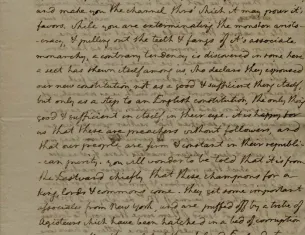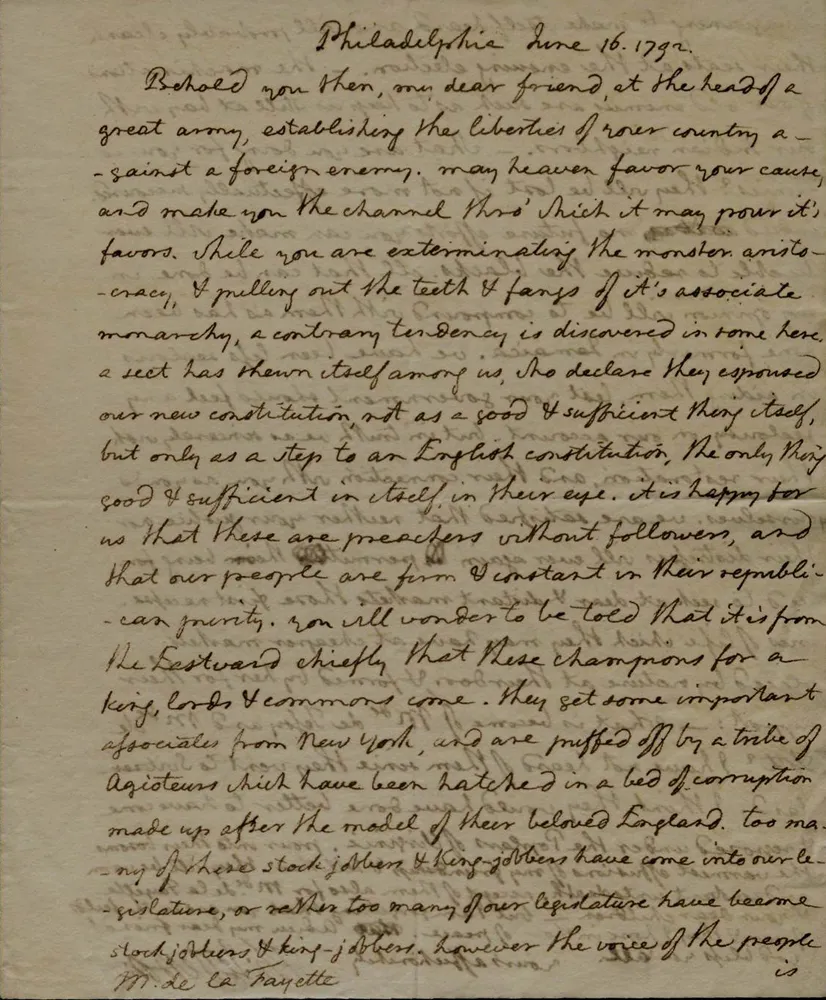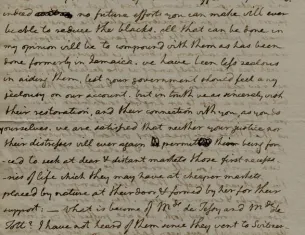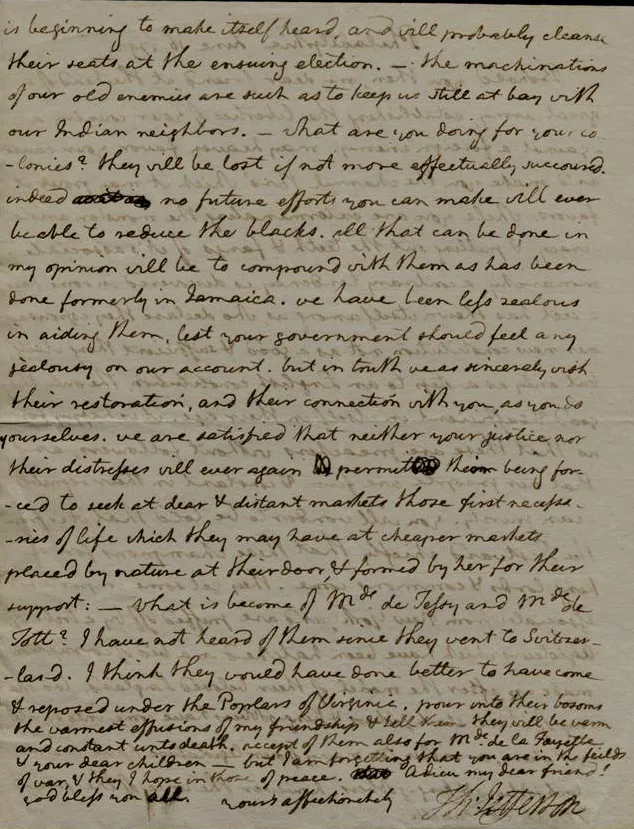Jefferson to Lafayette on the Haitian Revolution, 1792

Thomas Jefferson to Marquis de Lafayette, June 16, 1792 (The Gilder Lehrman Institute of American History)
When Thomas Jefferson wrote this letter on June 16, 1792, to the Marquis de Lafayette, three revolutions—the American, French, and Haitian—occupied the minds of these two renowned leaders. While the American Revolution had been won nearly a decade earlier, the US Constitution had been in effect for only three years, and the survival of the United States as a republic remained in doubt. In this letter, Jefferson expresses his opinion on the French Revolution and his concerns regarding France’s response to the Haitian Revolution. Two months after this letter was written, King Louis XVI would be deposed and Lafayette would be imprisoned.
A Letter from Thomas Jefferson to the Marquis de Lafayette, June 16, 1792
Philadelphia June 16, 1792.
Behold you then, my dear friend, at the head of a great army, establishing the liberties of your country against a foreign enemy. may heaven favor your cause, and make you the channel thro’ which it may pour it’s favors. while you are exterminating the monster aristocracy, & pulling out the teeth & fangs of it’s associate monarchy, a contrary tendency is discovered in some here. a sect has shewn itself among us, who declare they espoused our new constitution, not as a good & sufficient thing itself, but only as a step to an English constitution, the only thing good & sufficient in itself, in their eye. it is happy for us that these are preachers without followers, and that our people are firm & constant in their republican purity. you will wonder to be told that it is from the Eastward chiefly that these champions for a king, lords & commons come. they get some important associates from New York, and are puffed off by a tribe of Agioteurs which have been hatched in a bed of corruption made up after the model of their beloved England. too many of these stock jobbers & King-jobbers have come into our legislature, or rather too many of our legislature have become stock jobbers & king-jobbers. however the voice of the people is beginning to make itself heard, and will probably cleanse their seats at the ensuing election. – the machinations of our old enemies are such as to keep us still at bay with our Indian neighbors. – what are you doing for your colonies? they will be lost if not more effectually succoured. indeed no future efforts you can make will ever be able to reduce the blacks. all that can be done in my opinion will be to compound with them as has been done formerly in Jamaica. we have been less zealous in aiding them, lest your government should feel any jealousy on our account. but in truth we as sincerely wish their restoration, and their connection with you, as you do yourselves. we are satisfied that neither your justice nor their distresses will ever again permit their being forced to seek at dear & distant markets those first necessaries of life which they may have at cheaper markets placed by nature at their door, & formed by her for their support: – what is become of Mde de Tessy and Mde de Tott? I have not heard of them since they went to Switzerland. I think they would have done better to have come & reposed under the Poplars of Virginia. pour into their bosoms the warmest effusions of my friendship & tell them they will be warm and constant unto death. accept of them also for Mde de la Fayette & your dear children – but I am forgetting that you are in the fields of war, & they I hope in those of peace. Adieu my dear friend! God bless you all.
Yours affectionately
Th:Jefferson
Source: Thomas Jefferson to Marquis de Lafayette, June 16, 1792, The Gilder Lehrman Institute of American History, GLC08063.
A Letter from Thomas Jefferson to the Marquis de Lafayette, June 16, 1792
Philadelphia June 16. 1792.
Behold you then, my dear friend, at the head of a great army, establishing the liberties of your country against a foreign enemy. may heaven favor your cause, and make you the channel thro’ which it may pour it’s favors. while you are exterminating the monster aristocracy, & pulling out the teeth & fangs of it’s associate monarchy, a contrary tendency is discovered in some here. a sect has shewn itself among us, who declare they espoused our new constitution, not as a good & sufficient thing itself, but only as a step to an English constitution, the only thing good & sufficient in itself, in their eye . . . – what are you doing for your colonies? they will be lost if not more effectually succoured. indeed no future efforts you can make will ever be able to reduce the blacks . . . but in truth we as sincerely wish their restoration, and their connection with you, as you do yourselves. we are satisfied that neither your justice nor their distresses will ever again permit their being forced to seek at dear & distant markets those first necessaries of life which they may have at cheaper markets placed by nature at their door, & formed by her for their support: – what is become of Mde de Tessy and Mde de Tott? I have not heard of them since they went to Switzerland. I think they would have done better to have come & reposed under the Poplars of Virginia. pour into their bosoms the warmest effusions of my friendship & tell them they will be warm and constant unto death. accept of them also for Mde de la Fayette & your dear children – but I am forgetting that you are in the fields of war, & they I hope in those of peace. Adieu my dear friend! God bless you all.
Yours affectionately
Th:Jefferson
Source: Thomas Jefferson to Marquis de Lafayette, June 16, 1792, The Gilder Lehrman Institute of American History, GLC08063.
aristocracy - privileged upper class
monarchy - supreme power held by a single person
shewn - shown
succoured - helped, relieved
effusions - feelings
A Letter from Thomas Jefferson to the Marquis de Lafayette, June 16, 1792
Philadelphia June 16. 1792.
Behold you then, my dear friend, at the head of a great army, establishing the liberties of your country . . . exterminating the monster aristocracy, & pulling out the teeth & fangs of it’s associate monarchy . . . what are you doing for your colonies? they will be lost if not more effectually succoured. indeed no future efforts you can make will ever be able to reduce the blacks . . . but in truth we as sincerely wish their restoration, and their connection with you, as you do yourselves. . . . but I am forgetting that you are in the fields of war. . . . Adieu my dear friend! God bless you all.
Yours affectionately
Th:Jefferson
Source: Thomas Jefferson to Marquis de Lafayette, June 16, 1792, The Gilder Lehrman Institute of American History, GLC08063.
aristocracy - privileged upper class
monarchy - supreme power held by a single person
succoured - helped, relieved
Background
When Thomas Jefferson wrote this letter on June 16, 1792, to the Marquis de Lafayette, three revolutions—the American, French, and Haitian—occupied the minds of these two renowned leaders. While the American Revolution had been won nearly a decade earlier, the US Constitution had been in effect for only three years, and the survival of the United States as a republic remained in doubt. In this letter, Jefferson expresses his opinion on the French Revolution and his concerns regarding France’s response to the Haitian Revolution. Two months after this letter was written, King Louis XVI would be deposed and Lafayette would be imprisoned.
Transcript
A Letter from Thomas Jefferson to the Marquis de Lafayette, June 16, 1792
Philadelphia June 16, 1792.
Behold you then, my dear friend, at the head of a great army, establishing the liberties of your country against a foreign enemy. may heaven favor your cause, and make you the channel thro’ which it may pour it’s favors. while you are exterminating the monster aristocracy, & pulling out the teeth & fangs of it’s associate monarchy, a contrary tendency is discovered in some here. a sect has shewn itself among us, who declare they espoused our new constitution, not as a good & sufficient thing itself, but only as a step to an English constitution, the only thing good & sufficient in itself, in their eye. it is happy for us that these are preachers without followers, and that our people are firm & constant in their republican purity. you will wonder to be told that it is from the Eastward chiefly that these champions for a king, lords & commons come. they get some important associates from New York, and are puffed off by a tribe of Agioteurs which have been hatched in a bed of corruption made up after the model of their beloved England. too many of these stock jobbers & King-jobbers have come into our legislature, or rather too many of our legislature have become stock jobbers & king-jobbers. however the voice of the people is beginning to make itself heard, and will probably cleanse their seats at the ensuing election. – the machinations of our old enemies are such as to keep us still at bay with our Indian neighbors. – what are you doing for your colonies? they will be lost if not more effectually succoured. indeed no future efforts you can make will ever be able to reduce the blacks. all that can be done in my opinion will be to compound with them as has been done formerly in Jamaica. we have been less zealous in aiding them, lest your government should feel any jealousy on our account. but in truth we as sincerely wish their restoration, and their connection with you, as you do yourselves. we are satisfied that neither your justice nor their distresses will ever again permit their being forced to seek at dear & distant markets those first necessaries of life which they may have at cheaper markets placed by nature at their door, & formed by her for their support: – what is become of Mde de Tessy and Mde de Tott? I have not heard of them since they went to Switzerland. I think they would have done better to have come & reposed under the Poplars of Virginia. pour into their bosoms the warmest effusions of my friendship & tell them they will be warm and constant unto death. accept of them also for Mde de la Fayette & your dear children – but I am forgetting that you are in the fields of war, & they I hope in those of peace. Adieu my dear friend! God bless you all.
Yours affectionately
Th:Jefferson
Source: Thomas Jefferson to Marquis de Lafayette, June 16, 1792, The Gilder Lehrman Institute of American History, GLC08063.
Excerpt
A Letter from Thomas Jefferson to the Marquis de Lafayette, June 16, 1792
Philadelphia June 16. 1792.
Behold you then, my dear friend, at the head of a great army, establishing the liberties of your country against a foreign enemy. may heaven favor your cause, and make you the channel thro’ which it may pour it’s favors. while you are exterminating the monster aristocracy, & pulling out the teeth & fangs of it’s associate monarchy, a contrary tendency is discovered in some here. a sect has shewn itself among us, who declare they espoused our new constitution, not as a good & sufficient thing itself, but only as a step to an English constitution, the only thing good & sufficient in itself, in their eye . . . – what are you doing for your colonies? they will be lost if not more effectually succoured. indeed no future efforts you can make will ever be able to reduce the blacks . . . but in truth we as sincerely wish their restoration, and their connection with you, as you do yourselves. we are satisfied that neither your justice nor their distresses will ever again permit their being forced to seek at dear & distant markets those first necessaries of life which they may have at cheaper markets placed by nature at their door, & formed by her for their support: – what is become of Mde de Tessy and Mde de Tott? I have not heard of them since they went to Switzerland. I think they would have done better to have come & reposed under the Poplars of Virginia. pour into their bosoms the warmest effusions of my friendship & tell them they will be warm and constant unto death. accept of them also for Mde de la Fayette & your dear children – but I am forgetting that you are in the fields of war, & they I hope in those of peace. Adieu my dear friend! God bless you all.
Yours affectionately
Th:Jefferson
Source: Thomas Jefferson to Marquis de Lafayette, June 16, 1792, The Gilder Lehrman Institute of American History, GLC08063.
aristocracy - privileged upper class
monarchy - supreme power held by a single person
shewn - shown
succoured - helped, relieved
effusions - feelings
Excerpt 100
A Letter from Thomas Jefferson to the Marquis de Lafayette, June 16, 1792
Philadelphia June 16. 1792.
Behold you then, my dear friend, at the head of a great army, establishing the liberties of your country . . . exterminating the monster aristocracy, & pulling out the teeth & fangs of it’s associate monarchy . . . what are you doing for your colonies? they will be lost if not more effectually succoured. indeed no future efforts you can make will ever be able to reduce the blacks . . . but in truth we as sincerely wish their restoration, and their connection with you, as you do yourselves. . . . but I am forgetting that you are in the fields of war. . . . Adieu my dear friend! God bless you all.
Yours affectionately
Th:Jefferson
Source: Thomas Jefferson to Marquis de Lafayette, June 16, 1792, The Gilder Lehrman Institute of American History, GLC08063.
aristocracy - privileged upper class
monarchy - supreme power held by a single person
succoured - helped, relieved




